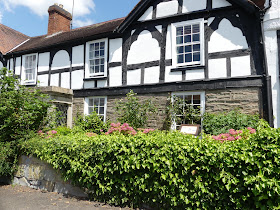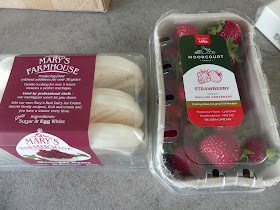On Thursday, 22nd June, D and I decided to go to Weobley - one of the villages on the Herefordshire "Black and White Village" Trail and my favourite.
Weobley is mentioned in the Domesday book and became a borough in the C13th with a fair being held from 1231. It was prosperous due to the wool trade and then due to ale and glove making. It has many late Medieval timber framed houses including examples of half Wealden and C15th hall houses.
By 1628 the town had a much smaller population and became a "Rotten Borough" with the Marquis of Bath being one of the influential patrons.
Sadly a fire in November 1948 destroyed many of the medieval buildings in the market square.
There is a Heritage Trail round the village which D and I have walked several times over the years.
The manor house in the photo below is a C16 hall house made up of a central hall around which daily life would have revolved. The private family quarters were on the left in the solar wing and the service quarters were in the other wing.
This is Glebe House probably the only Georgian house in Weobley built c1780 and in 1821 it became the vicarage. The house was mentioned in Dorothy Wordsworth's diary when she writes about having tea in the garden.
St Peter and St Paul Weobley - I'll write about the church in the next post as I managed to visit for a second time to get more photos of the interior.
Record shot of a Red Kite - D had seen swifts (unbelievably the first I have seen this year) nesting in the church roof.
The Old Corner House - C15th and jettied with a 2 bay cross wing on the corner. It now houses a tea room (info for Pete from The Quacks of Life) :)
The Red Lion C15th or earlier with later additions. Once a hotel now a restaurant.
A lovely cruck timber framed house where the curved timber (one of a pair) supports the roof.
Plants in Walls
The Gables the largest Hall House in Weobley with a later Georgian Porch. On D and I's first visit we had a lovely lunch here and we all stayed bed and breakfast for a long weekend a few years ago.
The "classic view" of Weobley - shame about the parked cars!
The Green Bean and the main reason for our visit as I had heard via a friend who lives nearby that they had some of the delicious Lyonshall strawberries in stock. They sell deli items, books and note Pete there is a tearoom too :)
Timothy on the market square
The market square with Magnus the Magpie - a sculpture by Walenty Pytel. (We've seen more of his work in Leominster in the past). The magpie is a symbol of the "black and white villages".
The red brick building is the Corn Mill built 1850/60.
The pump house in the car park built to reflect the local building style.
If you want to see more of Weobley just click on "Weobley" in labels on the right hand side. There are photos of the castle and many more of the interesting houses and buildings in the village.
There was no shade in the car park to eat lunch and it was hot! So we moved on to nearby Dilwyn which I knew had a village green shaded by trees.
Swallow or house martin nest on a house.
While here I decided to go back to St Mary the Virgin, Dilwyn as on the last visit I hadn't seen the labyrinth in the churchyard.
D had stopped in the car which was a pain (I think he thought I was about to disappear in another church!) as I needed someone taller to get a better photo of the labyrinth in the grass. The sun and shade played havoc too so photos aren't brilliant.
This was marked as a Wild Flower Conservation area but sadly it had been mowed. It might be me but surely it is a bit early to cut a wild flower meadow area?
If you want to see the inside of the church and more of Dilwyn village please see Dilwyn and St Mary's Church
On the way home we stopped off at Monkland Cheese shop to buy cheeses and some rather lovely local crisps but they were closed that week. I drove up the lane to turn round and found a sign for Monkland Common which might have some nice walks.
Purchases from the Green Bean - the strawberries were delicious.
Photos taken by me with the Panasonic Lumix FZ330 bridge camera and those marked *D by my son with the Canon SX50HS. (I don't particularly rate my photos but if anyone wishes to use one or mine or my son's I would be grateful for an email first - thanks).
Reference: Information Boards round Weobley
Pevsner Buildings of England Herefordshire Nikolaus Pevsner and Alan Brooks Yale University Press 2012.


















































My goodness. you bought Mary's Farmhouse Dairy meringues. I know the owner! He supplies the chocolate shop where I used to work. It's a small world.
ReplyDeleteWell, that certainly is a place of a photo opportunity. I'd say on every corner. But it's more like with every step. Beautiful photo of the kite. D must have a very good camera? Or alternatively, a very good eye.
By the way if you ever see Mary's farmhouse dairy ice cream on sale it's quite good. but to be honest, there are better ones out there now. Although the cost of an ice cream cone these days is exorbitant. Maybe you could treat Timothy to one occasionally?
Rustic Pumpkin - Thanks so much Debbie - gosh it is a small world! The meringues were lovely :) Weobley is really lovely and so interesting - it has a lot of listed buildings :)
ReplyDeleteTimothy had an ice cream cone yesterday :) Cappucino! Not Mary's farmhouse though.
We visited Weobley when we did the Herefordshire black and white trail, in 2008. I remember that it was my favourite too! It was such a lovely day! (What a shame about the fire in 1948!)
ReplyDeleteLovely photos! 😄
Sal - Thanks so much. Its a super trail although there are still a few villages I need to visit. Weobley I felt was so special and had a lovely atmosphere. The first time my son and I went I said to him I could live here!
ReplyDeleteWeobley is not a place I'd known about until now. I've done a little reading, the village did not lose any men during WW2 which is interesting. Also I read like most pretty (preserved for historical interest) villages today Weobley only survived because it was a failing village economically - only something like 650 people living there in the 1950's - Broadway in the Cotswolds is a good example of this, before the 1960's it was in a bad place, open sewers and buildings near collapse. Tourism saved it. Lovely post.
ReplyDeleteWessex Reiver - Thanks so much Andrew and for the interesting information about WW2 and Broadway and Weobley too. If you are ever in Herefordshire its well worth doing the "black and white village" trail or at least some of it. Pembridge and Eardisland are particularly lovely too.
ReplyDeleteHow wonderful Weobley looks with all the black and white houses so many still left, thank goodness,after the fire. Wonderful shot of the red kite. I'm glad you found and enjoyed strawberries from the Green Bean, shame the cheese shop was closed:)
ReplyDeleteRosie - thanks so much. I really do love Weobley - David checked and there are an awful lot of listed buildings there - can't remember now exactly how many but it was a lot. I think the cheese shop was closed for decorating - not sure but it was shut for a whole week. They used to make cheese and sell it but they've stopped making their own now and just sell other cheeses. I never bought their own cheeses though as they used non veggie rennet.
ReplyDeletedefinitely worth a visit ;) those black and white buildings are so picturesque!
ReplyDeletewaves at Timothy
The Quacks of Lifge - Thanks Pete and yes do visit :)
ReplyDeleteIt's such a lovely village. Must go soon and explore properly on foot. Not too far to go and lots to see in the general area.
ReplyDeleteBovey Belle - Thanks so much. Yes its really wonderful there. If you have time see if you can pick up a Heritage Trail leaflet (I think there may be a website with the trail on too?) which tells you a lot about the best buildings to look out for. We've done most of it over about 2 visits in the past. Yes there are some superb black and white villages in that area. You have probably been to some of them but Dilwyn, Pembridge and Eardisland are very good too plus the churches there. I still have some of the churches to visit like Eardisley although last Sunday I did manage to get to Flower Festival at Kingsland church.
ReplyDeleteI love those old buildings, they look so interesting.
ReplyDeleteHello Timothy :-)
CherryPie - Thank you - Timothy waves back :)
ReplyDeleteYum yum to the strawberries and meringue - did you make Eton Mess? I remember Weobley from last year's photos and it is a really lovely town. As far as I understand, you have either spring wildflowers which you would mow after the seedheads have dried out and dispersed, or late summer flowers which (I think) you might mow early in the spring then leave to grow to flower in say August and September. You need to have a lot of rain for a late summer wildflower meadow though - wouldn't work around these hot dry parts but from the sounds of your weather in July you should get a lot of late wildflowers! Having said that, it has been lovely and green here until quite recently as we had a decent amount of rain in June so wildflowers like Scabious have carried on flowering much later than the other years we have been here.
ReplyDeleteMillymollymandy - Thanks so much. Eton mess was made :)
ReplyDeleteI really do love Weobley - one of my favourite towns and believe me I could quite happily live there permanently.
You are right about the spring meadows and late summer meadows. At home we have the latter or rather a mini one! So perhaps churchyard one is spring meadow as you suggest. We have a lot of scabious in flower at home at the moment. A beautiful flower. Believe me over here July has been very wet!!! Something to do with the gulf stream moving south and it looks as though rainy days will continue well into August!